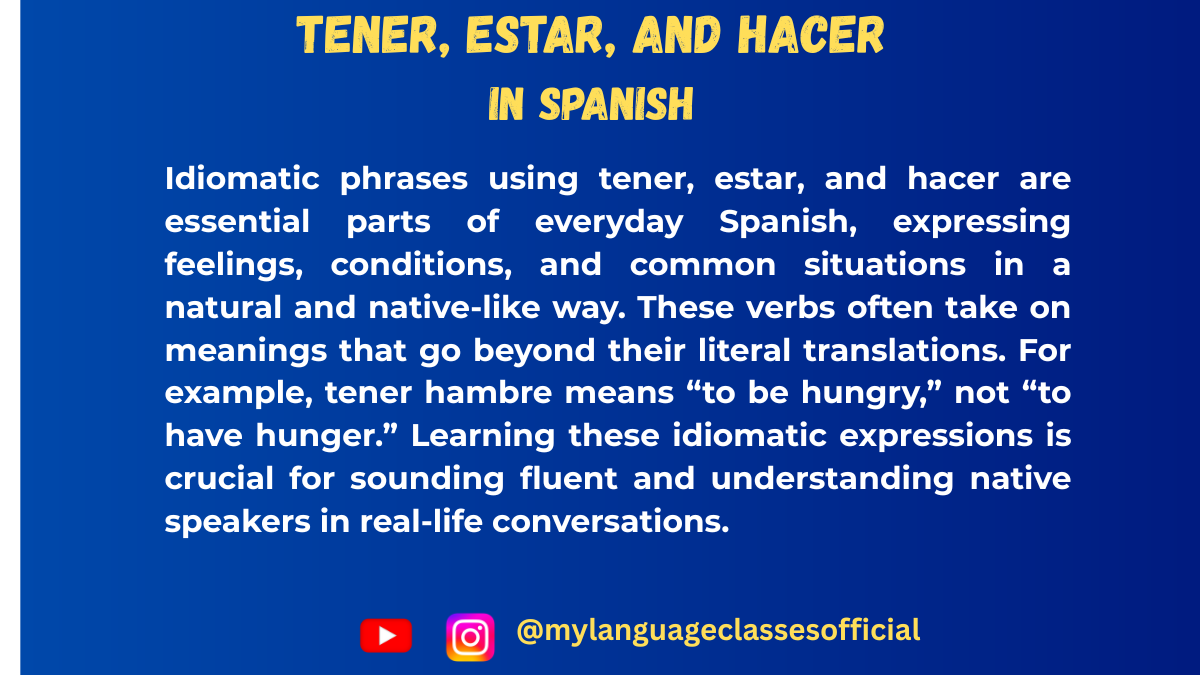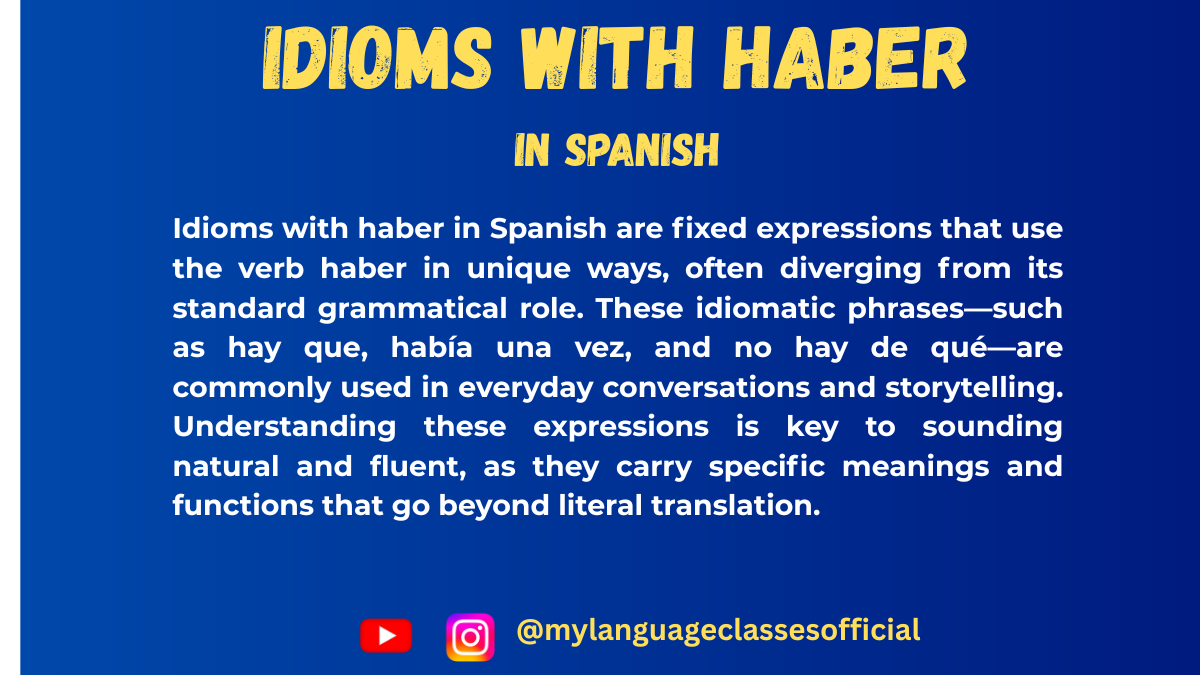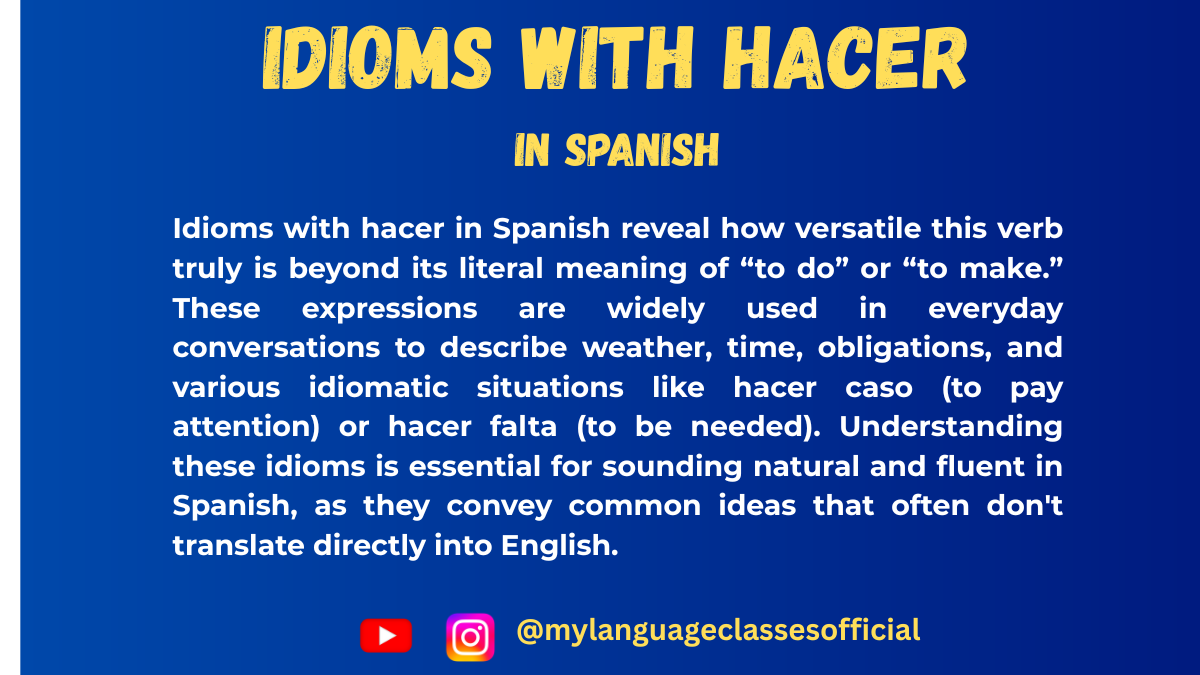Your cart is currently empty!
Category: Tenses in Spanish
Understand all Spanish verb tenses with simple explanations, conjugation charts, timelines, and practical examples. Learn how to use past, present, and future tenses in different moods like indicative, subjunctive, and imperative. Perfect for learners aiming for clear and fluent Spanish communication.
-
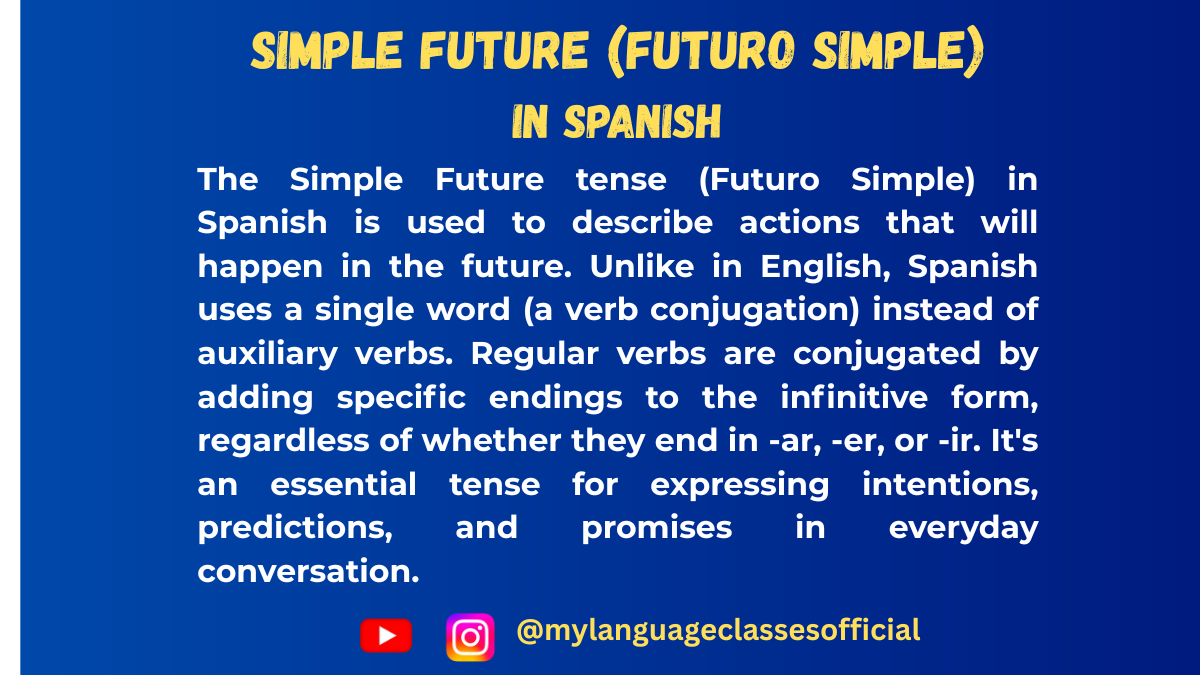
Simple Future (Futuro Simple) Tense/Mode in Spanish
The Simple Future tense, also known as “Futuro Simple” in Spanish, is used to talk about actions that will happen in the future. Unlike in English, where “will” is added before the verb, in Spanish, future tense is formed by adding specific endings to the infinitive form of the verb. This tense is straightforward and is commonly used in both spoken and written Spanish.
Common Expressions Using Simple Future
Here are some commonly used expressions in daily conversations that involve the Simple Future tense:
- Mañana será un gran día. – Tomorrow will be a great day.
- Nos veremos pronto. – We will see each other soon.
- Te llamaré más tarde. – I will call you later.
- Haré mi tarea después. – I will do my homework later.
- Iremos al cine esta noche. – We will go to the cinema tonight.
- Tendrás noticias mías pronto. – You will hear from me soon.
- Aprenderás español rápidamente. – You will learn Spanish quickly.
- Él llegará en cinco minutos. – He will arrive in five minutes.
- Lo entenderás con el tiempo. – You will understand it with time.
- Lloverá mañana. – It will rain tomorrow.
Things to Keep in Mind
- The infinitive form of the verb is used as the base for conjugation.
- Same endings apply to all three verb categories (-AR, -ER, -IR).
- There are no gender-based changes in conjugation.
- The plural and singular forms are indicated by the subject pronouns.
- Subject pronouns (yo, tú, él/ella/usted, nosotros/as, vosotros/as, ellos/ellas/ustedes) are optional but can be used for clarity.
- The Simple Future can also express probability or conjecture (e.g., “Serán las cinco.” – “It must be around five o’clock.”)
When to Use
The Simple Future tense is used in the following situations:
- To express future actions:
- “Mañana viajaré a España.” (Tomorrow I will travel to Spain.)
- To make predictions:
- “El clima estará soleado.” (The weather will be sunny.)
- To indicate probability or speculation:
- “¿Dónde estará Juan?” (Where could Juan be?)
- To give promises or commitments:
- “Te ayudaré con tu proyecto.” (I will help you with your project.)
- To give orders or instructions in a formal way:
- “Harás la tarea antes de salir.” (You will do the homework before going out.)
Conjugation
For regular verbs, the future tense is formed by adding the following endings to the infinitive form:
- Yo: -é
- Tú: -ás
- Él/Ella/Usted: -á
- Nosotros/as: -emos
- Vosotros/as: -éis
- Ellos/Ellas/Ustedes: -án
Regular Verb Conjugation Examples
Verb Meaning Example 1 Example 2 Hablar To speak Hablaré con mi amigo. Hablarás con el profesor. Comer To eat Comeré una pizza. Comerás en el restaurante. Vivir To live Viviré en Madrid. Viviremos en Barcelona. Escribir To write Escribiré una carta. Escribirás un correo. Bailar To dance Bailaré en la fiesta. Bailarán en el evento. Beber To drink Beberé agua. Beberemos jugo. Correr To run Correré en la mañana. Correrás en el parque. Leer To read Leeré un libro. Leerán una novela. Escuchar To listen Escucharé música. Escucharemos el podcast. Aprender To learn Aprenderé español. Aprenderemos juntos.
More Example Sentences
- Mañana estudiaré para el examen. (Tomorrow I will study for the exam.)
- ¿Vendrás a la reunión? (Will you come to the meeting?)
- Nos conoceremos en la universidad. (We will meet at the university.)
- Él comprará un coche nuevo. (He will buy a new car.)
- ¿Qué harás esta noche? (What will you do tonight?)
- Viajarán a París el próximo año. (They will travel to Paris next year.)
- Cocinaré la cena esta noche. (I will cook dinner tonight.)
- ¿Pintarás tu casa el próximo mes? (Will you paint your house next month?)
- Se despertarán temprano mañana. (They will wake up early tomorrow.)
- Trabajaré en mi proyecto este fin de semana. (I will work on my project this weekend.)
Fill in the Blanks
- Yo ______ (hablar) con mi jefe mañana.
- Nosotros ______ (viajar) a México en verano.
- ¿Tú ______ (comer) en casa hoy?
- Ella ______ (escribir) una carta a su amiga.
- Nosotros ______ (leer) el periódico en la mañana.
- ¿Vosotros ______ (correr) en la maratón?
- Ellos ______ (escuchar) la radio después de la cena.
- Tú ______ (aprender) una nueva habilidad este año.
- Él ______ (comprar) un nuevo teléfono pronto.
- ¿Ustedes ______ (beber) café en la tarde?
Answers
- hablaré
- viajaremos
- comerás
- escribirá
- leeremos
- correréis
- escucharán
- aprenderás
- comprará
- beberán
Conclusion
The Simple Future tense in Spanish is easy to learn and useful in daily conversations. By practicing regular and irregular verbs, you can master this tense and confidently talk about future events. Keep practicing with common expressions, and you’ll be fluent in no time!
If you enjoyed this lesson, be sure to check out more posts like this on my blog at My Language Classes. Don’t forget to subscribe my YouTube channel and follow me on Instagram for the latest language learning tips and lessons. Leave a comment below to share your thoughts, or ask any questions you have about nouns.
Happy learning! 😊
📚 Continue Learning Spanish
-

Pretérito Indefinido vs. Imperfecto – Usage and Contrast Between Two Types of Past Tense in Spanish
Mastering Spanish Past Tenses with Confidence
Struggling to decide between Pretérito Indefinido and Pretérito Imperfecto? You’re not alone! These two essential Spanish past tenses often confuse learners — but once you crack the code, your ability to speak and write about the past in Spanish will skyrocket.
In this practical guide, you’ll discover the clear differences between Pretérito Indefinido and Pretérito Imperfecto, along with simple usage rules, real-life examples, and helpful tips that will make choosing the right tense second nature.
Whether you’re preparing for a Spanish grammar exam, polishing your skills for travel, or just aiming for fluent Spanish communication, mastering these tenses is non-negotiable. By understanding when to use simple past (pretérito perfecto simple) versus habitual or descriptive past (pretérito imperfecto), you’ll add depth and precision to your Spanish storytelling.
🔥 What you’ll learn in this post:
- How to use Pretérito Indefinido vs. Pretérito Imperfecto
- Key grammar rules and timelines
- 20+ example sentences with English translations
- A practice quiz with answers to test yourself
So grab your notebook or open your favorite language app — it’s time to unlock one of the most powerful grammar tools in the Spanish language!

Understanding Pretérito Indefinido and Pretérito Imperfecto
Pretérito Indefinido (Simple Past) Usage:
Used to describe actions that are completed in the past with a definite beginning and end.
- Single events: “Ayer fui al cine.” (Yesterday, I went to the cinema.)
- Sequential actions: “Llegué a casa, cené y me acosté.” (I arrived home, had dinner, and went to bed.)
- Specific duration: “Viví en Madrid por tres años.” (I lived in Madrid for three years.)
Pretérito Imperfecto (Imperfect Past) Usage:
Used for habitual actions, descriptions, and ongoing past actions with no definite beginning or end.
- Habitual actions: “Cuando era niño, jugaba en el parque todos los días.” (When I was a child, I used to play in the park every day.)
- Descriptions: “La casa era grande y tenía un jardín bonito.” (The house was big and had a beautiful garden.)
- Simultaneous actions: “Mientras leía, escuchaba música.” (While I was reading, I was listening to music.)
2. Formation of Pretérito Indefinido and Pretérito Imperfecto
Regular Verbs Conjugation
Pretérito Indefinido:
Subject -AR Verbs (Hablar) -ER Verbs (Comer) -IR Verbs (Vivir) Yo hablé comí viví Tú hablaste comiste viviste Él/Ella/Usted habló comió vivió Nosotros/as hablamos comimos vivimos Vosotros/as hablasteis comisteis vivisteis Ellos/Ellas/Ustedes hablaron comieron vivieron Pretérito Imperfecto:
Subject -AR Verbs (Hablar) -ER Verbs (Comer) -IR Verbs (Vivir) Yo hablaba comía vivía Tú hablabas comías vivías Él/Ella/Usted hablaba comía vivía Nosotros/as hablábamos comíamos vivíamos Vosotros/as hablabais comíais vivíais Ellos/Ellas/Ustedes hablaban comían vivían
3. Common Irregular Verbs in Pretérito Indefinido & Imperfecto
Verb Pretérito Indefinido (Yo Form) Pretérito Imperfecto (Yo Form) Ser fui era Ir fui iba Ver vi veía Tener tuve tenía Hacer hice hacía Decir dije decía Poner puse ponía Estar estuve estaba Poder pude podía Querer quise quería
❌ Common Mistakes & How to Avoid Them
Mixing up Pretérito Indefinido and Pretérito Imperfecto is one of the most frequent grammar mistakes among Spanish learners. Let’s look at the most common slip-ups — and how to fix them like a pro!
1. 📍 Using Pretérito Indefinido for Habitual Actions
Mistake: Cada verano fuimos a la playa.
Why it’s wrong: “Cada verano” (every summer) indicates a repeated, habitual action — not a one-time event.
Correct: Cada verano íbamos a la playa.
✅ Use Imperfecto for actions that happened regularly in the past.
2. ⌛ Using Pretérito Imperfecto for Completed Actions
Mistake: Ayer comía una pizza deliciosa.
Why it’s wrong: “Ayer” points to a specific, completed event.
Correct: Ayer comí una pizza deliciosa.
✅ Use Indefinido for actions with a defined start and end point.
3. 🧩 Forgetting Context Clues
Mistake: Choosing the tense randomly without thinking about the time frame.
How to fix it: Pay attention to time markers like:- Indefinido: ayer, el año pasado, una vez, en 2019
- Imperfecto: siempre, normalmente, cada día, cuando era niño
4. 💬 Mixing Both Tenses Incorrectly in the Same Sentence
Mistake: Cuando llegó, yo le abría la puerta.
Why it’s wrong: “Llegó” (arrived) is a completed action, and the ongoing action (opening the door) should also be in imperfect.
Correct: Cuando llegó, yo le abría la puerta.
✅ Use Indefinido for the interrupting action and Imperfecto for the ongoing one.
Pro Tip 💡
When in doubt, ask yourself:
- Is this a completed action? → Use Pretérito Indefinido
- Is this a habitual or ongoing action? → Use Pretérito Imperfecto
More Example Sentences
🕒 Pretérito Indefinido (Completed Past Actions):
- Ayer terminé mi tarea temprano.
Yesterday I finished my homework early. - El año pasado viajé a España.
Last year I traveled to Spain. - Compré un coche nuevo la semana pasada.
I bought a new car last week. - El concierto empezó a las ocho.
The concert started at eight. - Pedro ganó el premio en 2020.
Pedro won the prize in 2020. - Anoche cenamos en un restaurante elegante.
Last night we had dinner at a fancy restaurant. - Fui al médico el lunes.
I went to the doctor on Monday. - Ella escribió tres páginas en su diario.
She wrote three pages in her journal. - Ellos llegaron tarde a la reunión.
They arrived late to the meeting. - El examen terminó a las diez.
The exam ended at ten.
🔁 Pretérito Imperfecto (Ongoing or Habitual Past Actions):
- Cuando era pequeño, tenía un perro.
When I was little, I had a dog. - Siempre me gustaba leer antes de dormir.
I always liked to read before sleeping. - Mi abuela cocinaba todos los domingos.
My grandmother used to cook every Sunday. - En la escuela, escribíamos en cuadernos grandes.
At school, we used to write in big notebooks. - Cuando vivíamos en Barcelona, íbamos a la playa a menudo.
When we lived in Barcelona, we often went to the beach. - Los niños jugaban en el parque cada tarde.
The kids used to play in the park every afternoon. - Yo leía mucho cuando tenía tiempo libre.
I used to read a lot when I had free time. - Mi padre trabajaba en una oficina en el centro.
My father used to work in an office downtown. - Nosotros veíamos dibujos animados los sábados por la mañana.
We used to watch cartoons on Saturday mornings. - Antes, la gente escribía cartas en lugar de correos electrónicos.
In the past, people used to write letters instead of emails.
Things to Keep in Mind
- Gender & Plurality: Nouns and adjectives must agree in gender and number.
- Time Expressions: “Ayer” (yesterday) & “anoche” (last night) indicate Pretérito Indefinido, while “siempre” (always) & “antes” (before) suggest Pretérito Imperfecto.
- Mixed Usage: Some sentences may require both tenses: “Mientras estudiaba, sonó el teléfono.” (While I was studying, the phone rang.)
Exercise: Fill in the blanks
Complete the following sentences using the correct form of the verb in brackets—either Pretérito Indefinido or Pretérito Imperfecto.
- Cuando era niño, siempre __________ con mis amigos. (jugar)
- Ayer __________ una película muy interesante. (ver)
- Mi abuela __________ cuentos antes de dormir. (contar)
- La semana pasada __________ a la montaña. (ir)
- De pequeños, nosotros __________ mucho chocolate. (comer)
- El año pasado mi hermana __________ una guitarra. (comprar)
- Cuando vivía en México, __________ todos los días al trabajo en bici. (ir)
- El sábado pasado __________ una fiesta en casa de Laura. (haber)
- Antes, mis padres __________ en el campo. (vivir)
- Yo __________ muy feliz cuando estaba en la universidad. (ser)
- ¿Tú __________ en Madrid en 2019? (estar)
- Los niños __________ dibujos animados cada mañana. (ver)
- Mi primo __________ su pasaporte en el hotel. (olvidar)
- En el colegio, nosotros siempre __________ en grupo. (trabajar)
- Ayer por la tarde, ellos __________ a las cartas. (jugar)
- Mi madre __________ la cena cuando llegué. (preparar)
- Cuando era joven, Juan __________ muy tímido. (ser)
- ¿Qué __________ tú cuando sonó el teléfono? (hacer)
- Anoche, Marta __________ hasta tarde. (estudiar)
- Cuando llovía, nosotros no __________ al parque. (salir)
✅ Answers
Cuando era niño, siempre jugaba con mis amigos.
When I was a child, I always played with my friends.Ayer vi una película muy interesante.
Yesterday I watched a very interesting movie.Mi abuela contaba cuentos antes de dormir.
My grandmother used to tell stories before sleeping.La semana pasada fui a la montaña.
Last week I went to the mountains.De pequeños, nosotros comíamos mucho chocolate.
As kids, we used to eat a lot of chocolate.El año pasado mi hermana compró una guitarra.
Last year my sister bought a guitar.Cuando vivía en México, iba todos los días al trabajo en bici.
When I lived in Mexico, I used to go to work by bike every day.El sábado pasado hubo una fiesta en casa de Laura.
Last Saturday there was a party at Laura’s house.Antes, mis padres vivían en el campo.
Before, my parents used to live in the countryside.Yo era muy feliz cuando estaba en la universidad.
I was very happy when I was in college.¿Tú estuviste en Madrid en 2019?
Were you in Madrid in 2019?Los niños veían dibujos animados cada mañana.
The children used to watch cartoons every morning.Mi primo olvidó su pasaporte en el hotel.
My cousin forgot his passport at the hotel.En el colegio, nosotros siempre trabajábamos en grupo.
In school, we always worked in groups.Ayer por la tarde, ellos jugaron a las cartas.
Yesterday afternoon, they played cards.Mi madre preparaba la cena cuando llegué.
My mom was preparing dinner when I arrived.Cuando era joven, Juan era muy tímido.
When he was young, Juan was very shy.¿Qué hacías tú cuando sonó el teléfono?
What were you doing when the phone rang?Anoche, Marta estudió hasta tarde.
Last night, Marta studied until late.Cuando llovía, nosotros no salíamos al parque.
When it rained, we didn’t go out to the park.
✅ Conclusion: Mastering Spanish Past Tenses
Understanding the difference between Pretérito Indefinido and Pretérito Imperfecto is essential for speaking and writing accurately in Spanish. While the Indefinido is perfect for expressing completed actions at specific moments, the Imperfecto helps describe ongoing or habitual actions from the past. By practicing regularly and recognizing context clues, you’ll gain confidence in choosing the right past tense every time.
Ready to take your Spanish to the next level?
✅ Bookmark this guide for future reference.
✅ Share it with fellow Spanish learners!
✅ For more tips, example sentences, and grammar hacks, subscribe to our newsletter and follow MY Language Classes on YouTube and Instagram!✅Join our WhatsApp group
¿Tienes dudas? Drop your questions in the comments below — ¡estaré encantado de ayudarte!
📚 Continue Learning Spanish
-
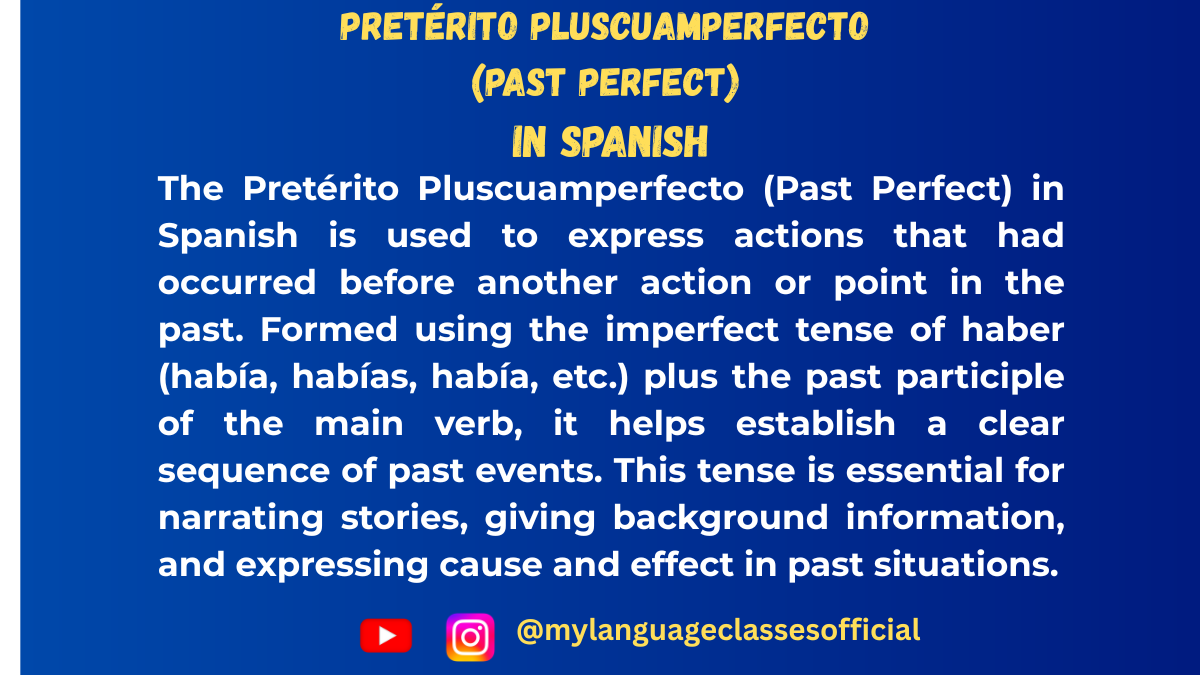
Pretérito Pluscuamperfecto (Past Perfect) in Spanish
The Pretérito Pluscuamperfecto, also known as the Past Perfect, is a verb tense used in Spanish to describe actions that occurred before another action in the past. It is commonly used in storytelling, recounting experiences, and expressing regrets or unrealized conditions.
How to Form the Pretérito Pluscuamperfecto
The Pretérito Pluscuamperfecto is formed using the imperfect tense of the auxiliary verb ‘haber’ + the past participle of the main verb.
Conjugation of ‘haber’ in Imperfect Tense
Subject Conjugation Yo Había Tú Habías Él/Ella/Usted Había Nosotros/Nosotras Habíamos Vosotros/Vosotras Habíais Ellos/Ellas/Ustedes Habían Forming the Past Participle
The past participle is formed by:
- -ar verbs → replacing -ar with -ado (e.g., hablar → hablado)
- -er and -ir verbs → replacing -er/-ir with -ido (e.g., comer → comido, vivir → vivido)
Uses of Pretérito Pluscuamperfecto
- To describe actions that happened before another past event
- Cuando llegué, ellos ya se habían ido. (When I arrived, they had already left.)
- To express past experiences before another event
- Nunca había visto una película tan emocionante. (I had never seen such an exciting movie.)
- To express regrets or missed opportunities
- Ojalá me hubieras avisado antes. (I wish you had told me earlier.)
- To talk about indirect speech in the past
- Dijo que ya había comido. (He said that he had already eaten.)
- To describe conditions in hypothetical past situations
- Si hubieras estudiado, habrías aprobado. (If you had studied, you would have passed.)
Common Expressions with Pretérito Pluscuamperfecto
Spanish Expression Meaning in English Ya había terminado I had already finished Nunca había visto I had never seen Todavía no había llegado I hadn’t arrived yet Antes de que llegara Before (he/she) arrived Apenas había empezado I had just started No había entendido nada I hadn’t understood anything Cuando llegué, ya se había ido When I arrived, (he/she) had already left No me había dado cuenta I hadn’t realized
Regular Verbs in Pretérito Pluscuamperfecto
Verb Yo Tú Él/Ella/Usted Nosotros Vosotros Ellos/Ellas/Ustedes Example Sentences Hablar (to talk) Había hablado Habías hablado Había hablado Habíamos hablado Habíais hablado Habían hablado 1. Cuando llegué, ellos ya habían hablado.
2. Nunca había hablado con ella antes.Comer (to eat) Había comido Habías comido Había comido Habíamos comido Habíais comido Habían comido 1. Ya había comido antes de salir.
2. Nunca había comido sushi.Vivir (to live) Había vivido Habías vivido Había vivido Habíamos vivido Habíais vivido Habían vivido 1. Había vivido en España por cinco años.
2. Nunca había vivido solo antes.
Irregular Verbs in Pretérito Pluscuamperfecto
Verb Past Participle Example Sentence Hacer (to do/make) Hecho Había hecho la tarea antes de la clase. Decir (to say) Dicho Nunca había dicho eso antes. Ver (to see) Visto Había visto esa película muchas veces. Escribir (to write) Escrito Habíamos escrito una carta. Romper (to break) Roto Había roto mi teléfono accidentalmente.
More Example Sentences
- Cuando llegué a casa, mi madre ya había cocinado.
- Nunca había viajado en avión antes.
- Habíamos hablado de este tema antes.
- Ya habías leído el libro cuando te lo recomendé.
- Ellos nunca habían visitado París.
- Cuando llegó la profesora, los estudiantes ya habían terminado el examen.
- Mi hermano había estudiado mucho antes del examen.
- Nosotros nunca habíamos visto un espectáculo tan impresionante.
- Habías olvidado mi cumpleaños otra vez.
- Antes de que saliera el sol, ya habíamos caminado muchos kilómetros.
Things to Keep in Mind
- Agreement in gender and number does not apply because the past participle remains the same.
- Articles like ‘el’ and ‘la’ follow standard noun rules.
- In negative sentences, ‘no’ comes before ‘haber’ (e.g., No había entendido).
- Reflexive verbs place the pronoun before ‘haber’ (e.g., Me había despertado temprano).
Fill in the Blanks
- Cuando llegué, ya ______ (terminar) la reunión.
- Nosotros nunca ______ (ver) una película tan interesante.
- Antes de salir, ya ______ (hacer) la tarea.
- Mi hermana ya ______ (decidir) qué estudiar.
- No me ______ (dar cuenta) de la hora.
- Cuando lo llamé, él ya ______ (salir) de casa.
- Nosotros ______ (comer) antes de la película.
- Cuando empezó la clase, ellos ya ______ (leer) el libro.
- Ella nunca ______ (visitar) ese museo antes.
- No ______ (escuchar) sobre ese problema antes.
Answers
- Había terminado 2. Habíamos visto 3. Había hecho 4. Había decidido 5. Había dado cuenta 6. Había salido 7. Habíamos comido 8. Habían leído 9. Había visitado 10. Había escuchado
Conclusion
The Pretérito Pluscuamperfecto is essential for narrating past events that happened before another past action. Mastering this tense helps in better storytelling, expressing regrets, and making past comparisons. Keep practicing with different verbs and contexts to use it naturally in conversations!
If you enjoyed this lesson, be sure to check out more posts like this on my blog at My Language Classes. Don’t forget to subscribe my YouTube channel and follow me on Instagram for the latest language learning tips and lessons. Leave a comment below to share your thoughts, or ask any questions you have about nouns.
Happy learning! 😊
📚 Continue Learning Spanish
-
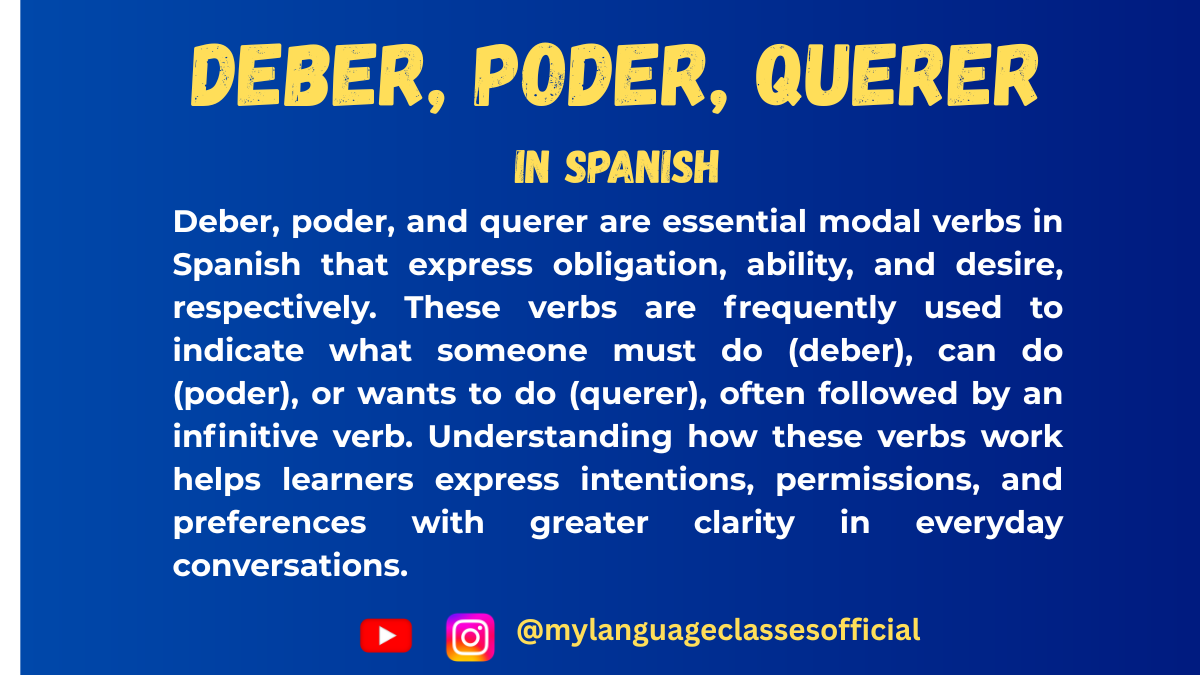
Mastering Deber, Poder and Querer in Spanish
Deber, Poder, Querer: Expressing Obligation, Possibility, and Desire in Spanish
In Spanish, the verbs deber, poder, and querer are commonly used to express obligation, possibility, and desire, respectively. Understanding how to use these verbs correctly is essential for fluent communication. In this blog post, we will explore their meanings, conjugations, and common expressions used in daily life.
1. Deber – Expressing Obligation
The verb deber translates to “must” or “should” in English and is used to indicate duty, necessity, or moral obligation.
Common Expressions with Deber
- Deber + infinitivo → “Must/should do something.”
- Debo estudiar para el examen. (I must study for the exam.)
- Debes comer más verduras. (You should eat more vegetables.)
- Deber de + infinitivo → Expresses probability or supposition.
- Debe de estar en casa. (He/She must be at home.)
Conjugation of Deber
Tense Conjugation Present Indicative debo, debes, debe, debemos, debéis, deben Preterite debí, debiste, debió, debimos, debisteis, debieron Imperfect debía, debías, debía, debíamos, debíais, debían Present Subjunctive deba, debas, deba, debamos, debáis, deban Imperative (no direct affirmative imperative; use subjunctive)
2. Poder – Expressing Possibility and Ability
The verb poder means “can” or “to be able to.” It is used to express ability, permission, or possibility.
Common Expressions with Poder
- Poder + infinitivo → “To be able to do something.”
- Puedo nadar bien. (I can swim well.)
- No puedes entrar sin permiso. (You can’t enter without permission.)
- ¿Se puede…? → Asking for permission.
- ¿Se puede fumar aquí? (Can one smoke here?)
- No poder más → “To be unable to handle something anymore.”
- No puedo más con este calor. (I can’t take this heat anymore.)
Conjugation of Poder (Irregular Verb)
Tense Conjugation Present Indicative puedo, puedes, puede, podemos, podéis, pueden Preterite pude, pudiste, pudo, pudimos, pudisteis, pudieron Imperfect podía, podías, podía, podíamos, podíais, podían Present Subjunctive pueda, puedas, pueda, podamos, podáis, puedan Imperative (no direct affirmative imperative; use subjunctive)
3. Querer – Expressing Desire and Intentions
The verb querer means “to want” or “to love.” It is used to express desires, wishes, and sometimes affection.
Common Expressions with Querer
- Querer + infinitivo → “To want to do something.”
- Quiero viajar a España. (I want to travel to Spain.)
- ¿Quieres salir esta noche? (Do you want to go out tonight?)
- Querer a alguien → “To love someone.”
- Te quiero mucho. (I love you a lot.)
- Querer decir → “To mean.”
- ¿Qué quiere decir esta palabra? (What does this word mean?)
Conjugation of Querer (Irregular Verb)
Tense Conjugation Present Indicative quiero, quieres, quiere, queremos, queréis, quieren Preterite quise, quisiste, quiso, quisimos, quisisteis, quisieron Imperfect quería, querías, quería, queríamos, queríais, querían Present Subjunctive quiera, quieras, quiera, queramos, queráis, quieran Imperative (no direct affirmative imperative; use subjunctive)
Key Considerations When Using Deber, Poder, Querer
- Articles and Gender:
- Use el, la, los, las with nouns when necessary.
- Example: Debes respetar las reglas. (You must respect the rules.)
- Plural vs. Singular:
- Conjugate the verb based on the subject.
- Example: Ellos pueden hablar inglés. (They can speak English.)
- Using the Subjunctive:
- Often follows expressions of doubt, wishes, or hypothetical scenarios.
- Example: Quiero que vengas conmigo. (I want you to come with me.)
- Negation:
- Use “no” before the verb to make it negative.
- Example: No debes mentir. (You must not lie.)
Conclusion
Mastering deber, poder, and querer is essential for effective communication in Spanish. These verbs allow you to express obligation, possibility, and desire in various situations. By understanding their conjugations, common expressions, and proper grammatical usage, you will significantly enhance your Spanish fluency. Keep practicing, and soon, you’ll be able to use them naturally in conversations!
If you found this guide helpful, I’d love to hear from you! Share your thoughts in the comments below or connect with me on social media. For more tips, resources, and inspiration, visit my blog at mylanguageclasses.in. Follow on Instagram and subscribe on YouTube
📚 Continue Learning Spanish
- Deber + infinitivo → “Must/should do something.”
-
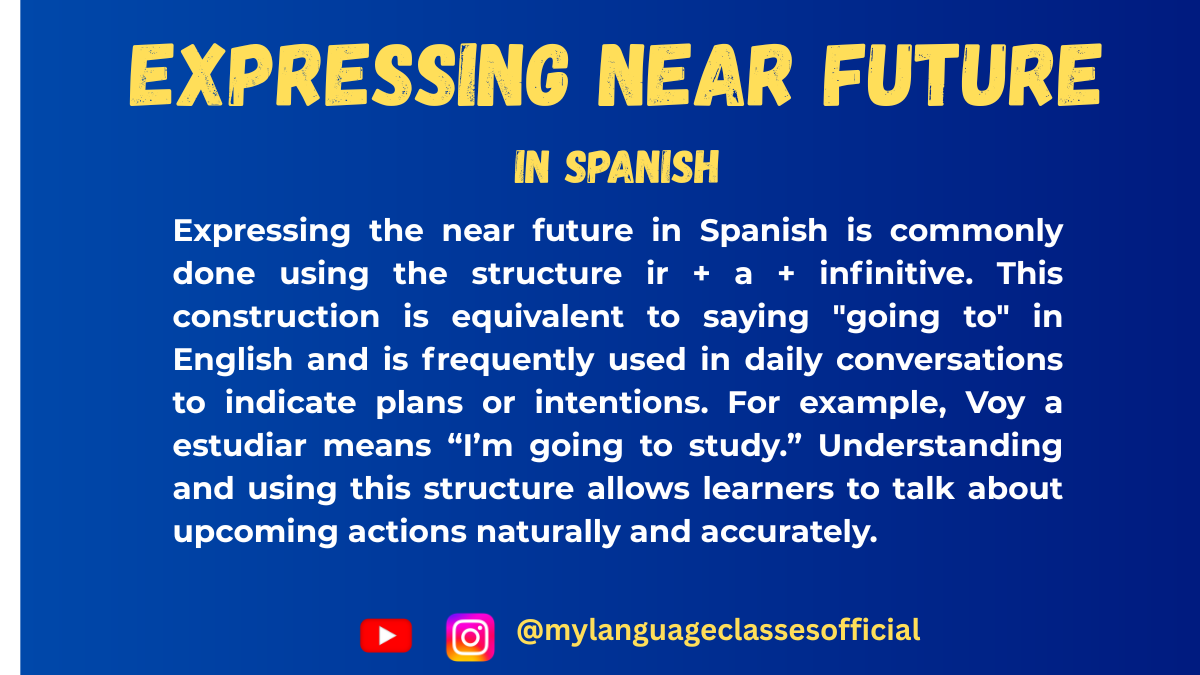
Ir a + Infinitive: Expressing Near Future in Spanish
Ir a + Infinitive: Expressing Near Future in Spanish
In Spanish, the construction “Ir a + infinitive” is commonly used to express actions that will happen in the near future. This is equivalent to the English “going to + verb” structure. It is widely used in spoken and written Spanish and is easier to learn compared to the simple future tense.
Formation of “Ir a + Infinitive”
The structure consists of three elements:
- The verb “ir” (to go) conjugated in the present tense.
- The preposition “a” (to).
- An infinitive verb (unconjugated verb).
Conjugation of “Ir” in Present Tense:
Subject Pronoun Conjugation of “Ir” Yo voy Tú vas Él/Ella/Usted va Nosotros/as vamos Vosotros/as vais Ellos/Ellas/Ustedes van Sentence Structure:
Subject + Ir (conjugated) + a + Infinitive Verb
Example Sentences:
- Voy a estudiar. (I am going to study.)
- Vamos a viajar a México. (We are going to travel to Mexico.)
- Ellos van a comprar una casa. (They are going to buy a house.)
Usage of “Ir a + Infinitive”
1. Near Future Actions
Used to express something that is about to happen soon.
- Voy a llamar a mi madre. (I am going to call my mother.)
- Ella va a cocinar la cena. (She is going to cook dinner.)
2. Intentions or Plans
Used when someone has planned to do something.
- Vamos a ver una película esta noche. (We are going to watch a movie tonight.)
- Voy a aprender español este año. (I am going to learn Spanish this year.)
3. Predictions Based on Evidence
Used when there is evidence that something is about to happen.
- Va a llover. (It is going to rain.)
- El bebé va a llorar. (The baby is going to cry.)
4. Giving Commands or Warnings
Used to give warnings or strong suggestions.
- Vas a romper el vaso. (You are going to break the glass.)
- Van a llegar tarde si no se apuran. (You all are going to be late if you don’t hurry.)
Articles, Gender, and Plural Considerations
When using “Ir a + Infinitive,” remember:
- Definite Articles (el, la, los, las) and Indefinite Articles (un, una, unos, unas) should match the noun in gender and number.
- Example: Voy a comprar una bicicleta. (I am going to buy a bicycle.)
- Example: Vamos a visitar el museo. (We are going to visit the museum.)
- Verb agreement: The conjugation of “ir” changes based on the subject.
- The infinitive verb does not change regardless of the subject.
Common Verbs Used with “Ir a + Infinitive”
Here is a list of common verbs and their “Ir a + Infinitive” forms:
Infinitive Verb Meaning “Ir a + Infinitive” Example Comer To eat Voy a comer pizza. (I am going to eat pizza.) Beber To drink Vas a beber agua. (You are going to drink water.) Estudiar To study Ella va a estudiar matemáticas. (She is going to study mathematics.) Viajar To travel Vamos a viajar a España. (We are going to travel to Spain.) Comprar To buy Van a comprar un coche. (They are going to buy a car.) Hacer To do/make Voy a hacer mi tarea. (I am going to do my homework.) Tener To have Vas a tener una sorpresa. (You are going to have a surprise.) Llegar To arrive Ella va a llegar temprano. (She is going to arrive early.) Jugar To play Vamos a jugar fútbol. (We are going to play soccer.) Dormir To sleep Van a dormir temprano. (They are going to sleep early.) Regular and Irregular Verbs in “Ir a + Infinitive”
All verbs, whether regular or irregular, remain in the infinitive form after “a.”
Regular Verbs (AR, ER, IR Verbs)
- Hablar (to speak): Voy a hablar con mi amigo. (I am going to speak with my friend.)
- Comer (to eat): Vamos a comer paella. (We are going to eat paella.)
- Vivir (to live): Ellos van a vivir en Barcelona. (They are going to live in Barcelona.)
Irregular Verbs
- Hacer (to do/make): Voy a hacer la tarea. (I am going to do the homework.)
- Tener (to have): Ella va a tener una fiesta. (She is going to have a party.)
- Poder (to be able to): Van a poder salir temprano. (They are going to be able to leave early.)
Conclusion
The “Ir a + Infinitive” structure is one of the most practical and commonly used ways to express the near future in Spanish. It is simple to form and widely understood in all Spanish-speaking regions. By practicing this structure with different verbs, you can quickly improve your Spanish fluency and express future plans with confidence.
Now that you understand how to use “Ir a + Infinitive”, start practicing by forming your own sentences!
If you found this guide helpful, I’d love to hear from you! Share your thoughts in the comments below or connect with me on social media. For more tips, resources, and inspiration, visit my blog at mylanguageclasses.in. Follow on Instagram and subscribe on YouTube
📚 Continue Learning Spanish


